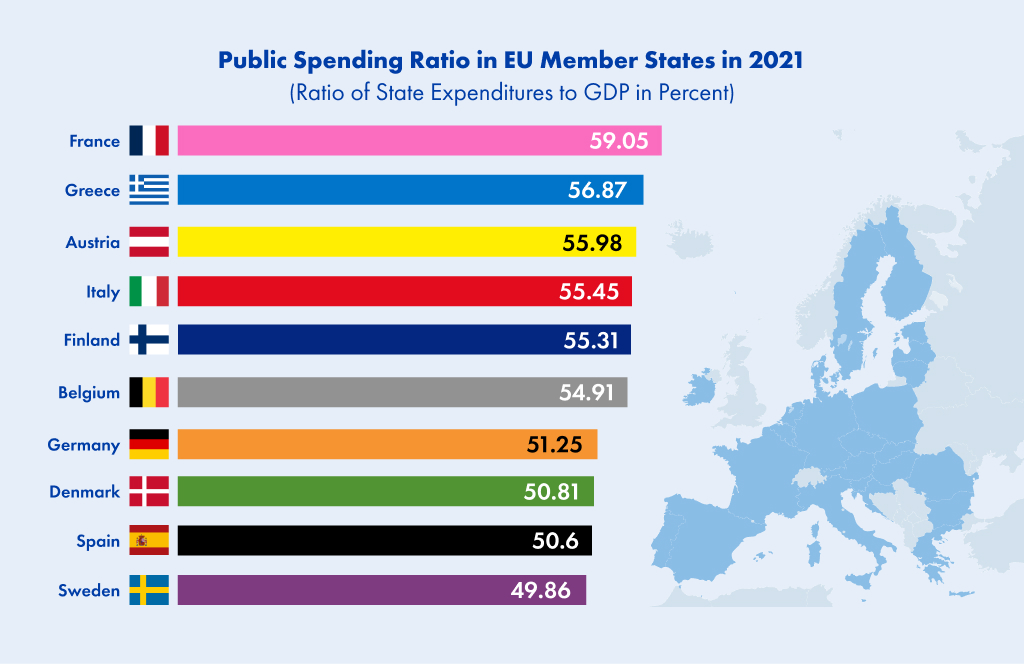Issue #120
Guten Morgen! Welcome to another edition of the Krautshell! This week, Jonny takes a sharp look at the State of Israel in his House’s View, linking domestic political developments with the broader geopolitical environment. In addition, our main articles cover German Health Minister Karl Lauterbach’s foray into something other than COVID Policy and a controversial German electoral reform (and how it became necessary in the first place). Finally, enjoy Anna’s take on the perceived Doppelmoral (hypocrisy) of some German Greens ministers, and what last weekend’s Academy Awards have to do with it. Have a great weekend! Anna Szilvia What the Health? After what feels like an eternity, more and more individuals – including President Biden and Germany’s (second, keep reading to find out why) most famous virologist Christian Drosten – are saying that the COVID-19 pandemic is finally over. Welcome news for everyone on the planet; that is, except if you’re Germany’s Federal Minister of Health, Karl Lauterbach. To quickly jog your memory: Lauterbach has been a celebrity politician in Germany over the past few years – he’s a health economist by trade, but TV star by nature. Even before he became Germany’s top Health politician, he was a regular in evening talk shows. Unsurprisingly, his raison d’être since coming into office has been fighting the pandemic. But, in the words of Andrea Bocelli, it’s time to say goodbye (to a one issue-oriented Ministry). Yes, indeed, Lauterbach must do the unthinkable: tackle other health-related issues in Germany. *GASP* But in all seriousness, Lauterbach certainly has his work cut out for him, as the issues have been piling up. First: the electronic patient file (EPA). Essentially, all your health data in one digital place. Like many other German digitization projects, it has been met with a hefty sprinkle of “nope” from Germany’s top data protection officer. Now, in an interview last week, Lauterbach stated it would be mandatory to offer this service by the end of 2024. Next, weed. The EU has essentially given the green light for Lauterbach to present a draft law in the coming weeks to legalize recreational cannabis in Germany. Although majority of Germans support this move, you can expect a wide array of actors to protest against the move. Finally, Lauterbach has set in motion plans for a “Federal Institute for Public Health.” Here, the idea would be to keep a watchful eye on any worrying health trends for the greater public – everything from pandemic monitoring to nutritional issues, all the way to the combination of health and sustainability. So, expect a lot of developments in the coming months. We’ll keep you posted. See you in Karlsruhe! The US electoral system – specifically the Electoral College – is something many Germans struggle to understand. “Confusing”, is one of the adjectives you’ll hear when presidential election seasons comes around, and fair enough: Most people can’t be expected to understand the role it plays in the US constitutional framework. But Germans calling the Electoral College “confusing” may seem odd considering the absolute muddle that is Germany’s electoral system, a muddle which has made the Bundestag the world’s largest freely elected parliament and prompted a hotly contested electoral reform which passed this week. Here’s some background. German MPs are elected through a mix of majority and proportional representation. This means that citizens vote twice, once (first vote) for a candidate in their constituency and once (second vote) for their preferred party. If a party wins more (first vote) direct constituencies than its (second vote) overall share of the popular vote, other parties can receive so-called “leveling seats” to ensure proportional parliamentary representation. This sounds sort of logical (albeit complicated) except for the fact that it leads to a bigger and bigger parliament: From 603 seats in 2002 to 736 in the most recent 2021 elections. Long story short: The Social Democrat-Greens-Liberal coalition this week passed an electoral reform to correct this imbalance, but the opposition has serious constitutional and political concerns. Simply put, the law foresees that in the future, directly elected (first vote) candidates move into the Bundestag only if their mandates are covered by their party’s proportional (second vote) results. And while this would technically solve the problem by eliminating the bothersome “leveling seats”, consider this: Under the new law, a candidate could fail to win a seat even if he won his constituency in a landslide, something which (according to the opposition) undermines the democratic principle and breaks with German federalism. Moreover, the CDU’s Bavarian sister-party CSU – very strong in Bavarian constituencies but nowhere else – fears it could be excluded from parliament in the future. Both parties have therefore declared they will take the matter to Germany’s Federal Constitutional Court in Karlsruhe. We’ll keep you posted! Source: Statista THE HOUSE’S VIEW: by Jonny What We Shouldn’t Forget… Normally, my dear colleague Maximilian is responsible for razor-sharp geopolitical analyses, but since he had his turn last week, you’ll have to make do with me discussing the Middle East today. And I want to talk about the recent developments in Israel and their maybe somewhat neglected importance for global security policy as all eyes currently seem to look at Ukraine and China. The Reform That Doesn’t Deserve Its Name The trigger for the protests of large parts of the Israeli civilian population, which have been ongoing for two months now, is a “reform” planned by the new old Prime Minister Netanyahu (Likud) and his government, which comprises also right-wing and ultra-Orthodox parties. As most of you surely know, the reform provides that the Supreme Court of Israel as well as the Attorney General’s Office will be weakened in favor of the parliament and the government, respectively. Laws that are rejected by Israel’s Supreme Court could in the future, after all, be passed by a simple parliamentary majority (which previously passed this very law anyways). This would massively weaken Israel’s judiciary and thus the foundations of its constitutional state. Us vs. Them For several years now, the political landscape in Israel has basically been going through a similar development as the U.S. before and during President Trump’s term in office. The high bodies of the judiciary and administration are occupied by more liberal citizens of a supposed “elite” that people on the right and conservative base reject. Consequently, the narrative is not (who’s surprised?): “We are now weakening our rule of law,” but rather: “We are taking our country back from the clutches of the ivory tower.” The debate in Israel is heated, and for each of the two camps it seems at times to have become a battle where people think only in terms of “black” and “white.” A fundamental rupture between the more secular and liberal Jews on the one hand and the ultraorthodox right-wing Jews on the other is looming in Israel, if it has not already happened. Conceivably Unfavorable Timing All this is happening at a time when violence between the Israeli army and Palestinians is once again on the rise on a massive scale. At the same time, terrorist attacks by Palestinian militias in Israeli cities are not long in coming. The situation is more than just heated, and the right-wing Orthodox parties in Israel, which advocate a stronger settlement policy and oppose the two-state solution, are also making political capital out of this. Internal Conflicts Meet External Threats All of this is also happening while scientists from the International Atomic Energy Agency (IAEA) have found near-weapons-grade uranium in Iran. The self-declared mortal enemy of the state of Israel could thus incidentally also rise to the status of a nuclear power, which in turn is likely to lead to an escalation of the security policy situation in Israel. For some time now, there has been repeated speculation about an impending war between the two countries, and information that has recently become public (reporting strikes against Iranian military sites) suggests that Israeli security forces are already trying to attack various Iranian targets. A domestic political crisis at the same time, splitting its own population into two hostile camps, is probably not particularly helpful when faced with the current situation. Unrest and terrorist attacks in the settlement regions and a declared mortal enemy on the verge of becoming a nuclear power – not great. The House’s View Both Germany and the United States maintain their friendship with the State of Israel for good reasons. In the case of Germany, there is a whole range of historical reasons and responsibilities, but there is also a geopolitical interest in a stable democracy with a strong military that sees itself as an ally of the West in this region. It is difficult for us in Germany to criticize Israeli politics, partly because many people do so in order to engage in anti-Semitism under this guise. Thus, it is worth noting that on Thursday, when the German Chancellor welcomed Prime Minister Netanyahu in Berlin, he publicly expressed his displeasure at a press conference and criticized the planned reform. Earlier, U.S. Defense Secretary Austin had done similar things during a visit to Israel. “Israel’s security is never negotiable for me as German chancellor” – Scholz’s predecessor Angela Merkel said this historic sentence in a speech to the Israeli parliament in 2008. It may now be necessary to help Israel protect itself … from itself. Weakening the judiciary would potentially allow the current Israeli government to pursue a much more aggressive course against the Palestinians but also against hostile Islamic states such as Iran. Therefore, Chancellor Scholz, with the help of the United States, should do everything possible to ensure that Israel’s status as a liberal democracy is preserved and that the country does not turn into an autocracy in which a prime minister driven by his coalition partners makes imprudent decisions. Netanyahu is sitting on a powder keg in terms of foreign policy – if the judicial reform goes through, no one will be able to take away his lighter. Wine and Water Grand style and glamour are not what Germany is known for. Dress up for an evening out, especially in Berlin, and you will get attention, just not the kind you were looking for. At the price ceremony at Berlinale, one of the biggest film festivals worldwide, the prevalent dress code is jeans and t-shirts. Only rarely, and mostly on foreign guests you will see the occasional evening gown. Not to mention the lack of allure from our movie stars. One of the reasons the world of Hollywood has such a fascination. Thus I fully understand Claudia Roth, our State Minister for Culture and Media, who jumped at the opportunity to attend this year’s Oscars, rooting for the German contribution “All Quiet on the Western Front”, a Netflix production supported with funds from the German Federal Film Board. I wouldn’t have missed out on that one either. But then, I am not a prominent figure of the Greens, a party that not only is aiming to reduce, or even forbid air traffic, but also declared one of the government’s ambitions to avoid planes where humanly possible, and to resort to other forms of transportation, or online meetings, and only fly to crucially important and unavoidable meetings. I am still trying to figure out how the Oscar’s price ceremony qualifies for that. Another example: Foreign Minister Annalena Baerbock declared to use predominantly scheduled flights for her trips. The reality after a bit over one year in office: 2 out of 69 flights were scheduled ones. The justification: her tight schedule. Again: I am not blaming anyone, I see the need to sometimes meet in person, and I even more understand the time restrictions. But allowing those reasons only for their own justification, while everyone else is expected to use the train or just stay put, is not only hypocritical, but seems to be putting their own mission about everyone else’s. Drinking wine while preaching water most certainly won’t go down well with the voters. Issue #120


FIRST, SOME SOLID INTEL:
TAKE A BREAK, GIVE YOUR EYES A REST.

LONG STORY SHORT:
WHAT’S ON OUR MINDS:





